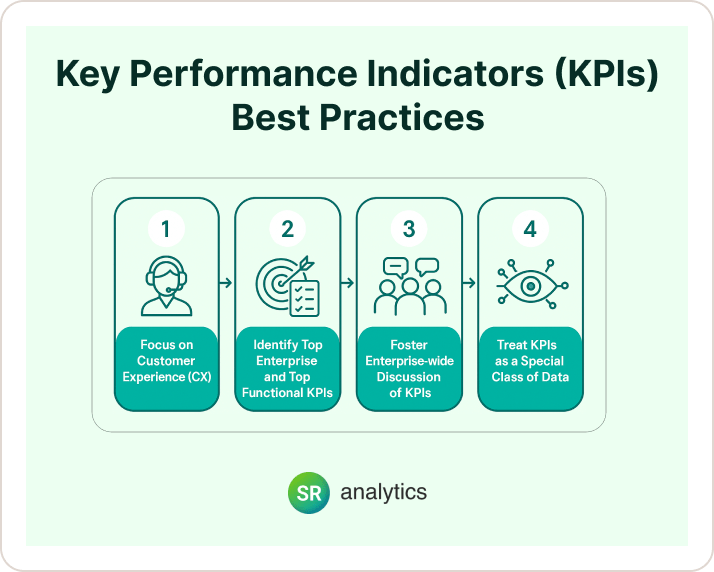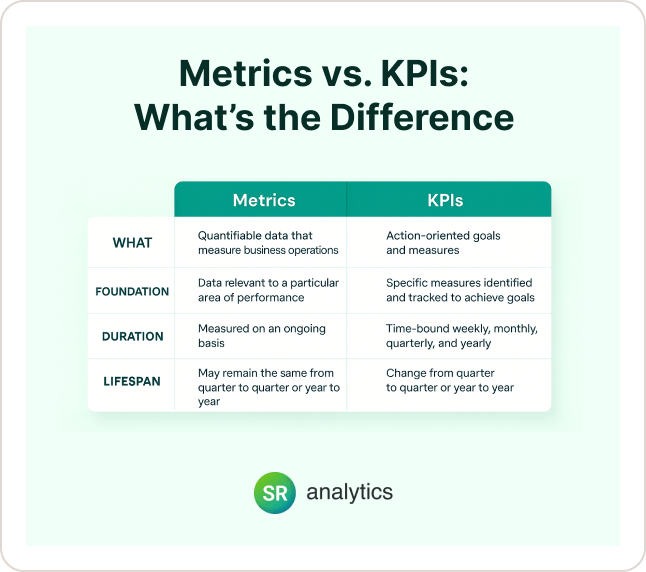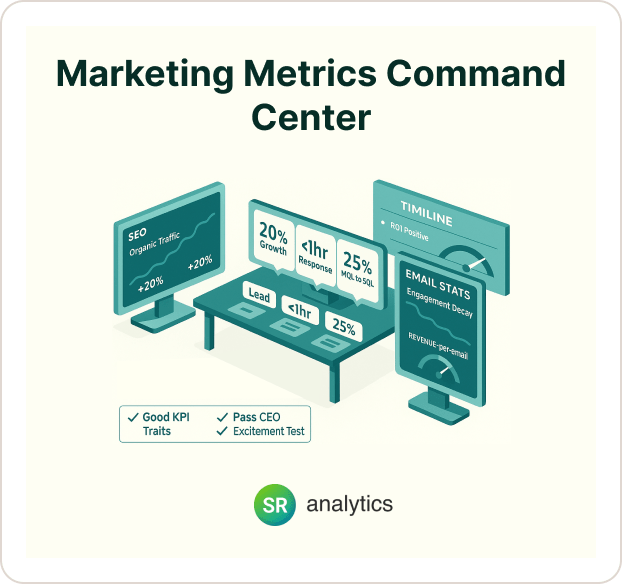Let’s be honest: If your boss asked you right now to prove your marketing actually works, would you panic a little?
You’re not alone. I’ve been in those budget meetings where everyone’s staring at you, waiting for proof that your campaigns aren’t just expensive hobbies.
Here’s what I learned the hard way: Most of us are tracking the wrong things. We celebrate metrics that make us feel good instead of the ones that actually matter to the business.
Three years ago, I was super proud of a campaign that drove 50,000 website visitors in one month. I felt like a marketing rockstar until someone asked, “How many of those became customers?”
The answer? Twelve.
That’s a 0.024% conversion rate, in case you’re wondering. Not exactly rockstar material.
That moment taught me everything about digital marketing KPIs. With over $1,000 billion in U.S. online retail sales and data creation exploding to 180+ zettabytes, we’re drowning in numbers. But most of them don’t actually help us make better decisions.
So let’s figure out which digital marketing KPIs actually matter for your business.

Why We Pick the Wrong Metrics (It’s Not What You Think)
Before we dive into what KPIs in digital marketing, let’s talk about why smart people consistently choose terrible metrics.
It’s not because we don’t know better. It’s because we’re human.
We gravitate toward metrics that make us look good. “We reached 2 million people!” sounds way better in meetings than “Our conversion rate is 1.2%.” One gets applause, the other gets awkward questions.
We avoid metrics that might expose problems. Ever notice how marketing reports always include reach and impressions but rarely include cost per customer? There’s a reason for that.
We choose metrics we can control. You can’t directly control sales, but you can control how many blog posts you publish or social media posts you share. Guess which ones end up in more reports?
Here’s the thing: Digital marketing KPIs should make you slightly uncomfortable. If all your metrics are trending up and to the right, you’re probably not measuring the stuff that matters.
KPIs in digital marketing exist to help you make better decisions, not to make you feel better about your job.

What Actually Makes a KPI Worth Tracking
Every article starts with the basic definition: Key Performance Indicator. But here’s the test that actually matters:
If this metric improved by 50% tomorrow, would your CEO care?
- Page views up 50%? Probably not.
- Revenue up 50%? Definitely yes.
- Email subscribers up 50%? Maybe, it depends on the business.
- Cost per customer down 50%? You’d be their new favorite person.
The most important digital marketing KPIs pass what I call the “CEO excitement test.” They connect directly to business outcomes that matter to the people who approve your budget.
Research shows that teams using proper KPI tracking are 128% more likely to rate their marketing as effective. But here’s what’s interesting: most teams think they’re already tracking the right stuff when they’re not.
The difference? Real digital marketing KPIs answer business questions, not just marketing questions.
Your Company’s KPI Evolution (The Stage Nobody Talks About)
Here’s something that might surprise you: The right KPIs for digital marketing change as your company grows. What works for a startup will kill a scale-up.
Early Stage: Proving It Works
What you should focus on: Website conversion rate, customer acquisition cost, user feedback What to avoid: Volume metrics before you know what actually converts
Growth Stage: Scaling What Works
What you should focus on: Cost per lead by channel, lifetime value, return on ad spend What to avoid: Still obsessing over brand awareness when you need profitable growth
Mature Stage: Optimizing Everything
What you should focus on: Market penetration, customer retention, competitive metrics What to avoid: Only looking at acquisition when retention drives most of your profit
I’ve seen companies struggle because they were using startup metrics with enterprise expectations. The KPI in digital marketing that got you here won’t necessarily get you where you’re going.
The KPIs That Actually Move the Needle

After tracking performance across hundreds of campaigns, here are the digital marketing KPIs that consistently correlate with business success:
Website & SEO KPIs You Can Act On
- Organic Traffic Growth Rate: Don’t just track total organic traffic – track the growth rate. A site getting 5% more organic traffic each month will outperform one with 10,000 static visitors. Why this matters: SEO leads close at 14.6% compared to 1.7% for outbound leads. When your organic traffic grows, your highest-quality leads grow with it.
- Conversion Rate by Traffic Source: Most people track overall conversion rate. That’s useful, but here’s what’s more useful: knowing that your email traffic converts at 4.2% while your social media traffic converts at 0.8%. The average e-commerce conversion rate is under 2%, but I’ve seen companies hit 12%+ by focusing their efforts on the traffic sources that actually convert.
- Pages per Session for Your Best Customers: Here’s a metric most people ignore: How many pages do your highest-value customers visit before they convert? If they typically browse 5+ pages while low-value customers bounce after one, you can start predicting customer quality before they even buy.
Lead Generation KPIs That Matter
- Lead Velocity Rate: Everyone tracks total leads generated. Winners track how fast lead generation is accelerating. A company generating 100 leads with 20% monthly growth will beat a company generating 500 flat leads every time.
- Speed to Lead Response: Your odds of reaching a lead drop by 10x after the first hour. Most companies obsess over lead volume but ignore how quickly they respond. Big mistake.
- MQL to SQL Conversion Rate by Channel: Not all leads are created equal. Your email leads might convert to sales opportunities at 25%, while social media leads convert at 5%. Knowing this helps you focus on quality, not just quantity.
Email Marketing KPIs Beyond Open Rates
- Email Engagement Decay Rate: The average email open rate is 42.35%, but here’s what’s more important: How quickly do new subscribers stop engaging? If 50% stop opening emails after three months, you have a content problem, not a list-building problem.
- Revenue per Email Sent: Instead of celebrating open rates, track total revenue divided by emails sent. If you send 10,000 emails and generate $5,000 in sales, that’s $0.50 per email. Way more actionable than knowing your open rate.
Paid Advertising KPIs That Show Real ROI
- Blended Customer Acquisition Cost: Most companies track CAC for paid channels but ignore that “free” organic customers still cost money through content creation, SEO, and social media efforts. Your true acquisition cost includes everything.
- Time to ROI Positive: The average Google Ads CTR is 6.11%, but what really matters is how long it takes for customer lifetime value to exceed what you spent to acquire them. Some channels pay back in 30 days, others take 18 months.
The Problems Nobody Warns You About
When Good Metrics Go Bad
I once worked with a company that rewarded marketers based on lead volume. Can you guess what happened? They started generating thousands of fake leads through contests and giveaways. Lead quality crashed, the sales team was furious, and the CEO blamed marketing.
The fix: Always pair quantity metrics with quality metrics. If you track lead volume, also track lead-to-customer conversion rate.
The Seasonality Panic
Most digital marketing KPIs have seasonal patterns, but marketers tend to panic at the first sign of decline. Black Friday conversion rates don’t matter in February. Back-to-school campaigns don’t work in December.
The fix: Compare year-over-year performance, not month-over-month changes.
Analysis Paralysis vs. Blind Spots
I’ve seen teams with 47-metric dashboards who couldn’t make simple decisions. I’ve also seen teams obsess over one metric and miss obvious problems everywhere else.
The sweet spot: 3-5 primary KPIs that drive your decisions, plus 10-15 secondary metrics for context.
How to Talk About KPIs (The Skill That Changes Everything)
Here’s what separates marketing analytics leaders from marketing managers: the ability to translate digital marketing KPIs into language that different people care about.
For Your CEO: Focus on Revenue Impact
“Our email campaigns generated $47,000 in revenue last month with a 12:1 ROI.”
For Your CFO: Focus on Efficiency
“We reduced customer acquisition cost by 23% while maintaining lead quality.”
For Sales: Focus on Pipeline Quality
“Marketing delivered 150 qualified leads with a 31% close rate, up from 22% last quarter.”
For Operations: Focus on Scalability
“Our current conversion funnel can handle 3x the traffic without additional resources.”
Same KPI data, four different conversations. Master this and you’ll never fight for a budget again.
Setting Up Tracking That Actually Works
Google Analytics is still the foundation, but here’s what most tutorials won’t tell you: 80% of companies set it up wrong.
Common mistakes I see:
- No conversion goals defined
- Inconsistent UTM parameters
- Broken e-commerce tracking
- Ignored attribution models
Better approach:
- Define your business goals first
- Pick KPIs that connect to those goals
- Set up tracking for those specific KPIs only
- Ignore everything else until you’ve mastered the basics
For more advanced needs, HubSpot’s integrated platform works well for companies that want everything in one place, while tools like Databox are great for visual reporting.
Pro tip: Spend more time analyzing the data you have than collecting new data. Most teams are data-rich but insight-poor.
Where You Stand: Benchmarks with Context
Here’s how you compare to everyone else, but remember – these are starting points, not finish lines:
- E-commerce conversion rate: Under 2% average (but top performers hit 15%+)
- Email open rate: 42.35% across industries (meaningless without conversion context)
- Google Ads CTR: 6.11% average (varies wildly based on keyword intent)
- B2B email conversion: 2.4% (can reach 8%+ with proper segmentation)
- Social referral traffic: 5% of total website traffic (often highest quality for some brands)
If you’re exactly at a benchmark, you’re probably not pushing hard enough. Great marketing is above average by definition.
Making KPIs Part of Your Culture
Digital marketing KPIs aren’t just measurement tools – they’re culture-change agents. The metrics you choose tell your team what success actually looks like.
Choose vanity metrics, get vanity results. Choose business metrics, get business results.
After working with hundreds of marketing teams, here’s what I’ve learned: The companies that win long-term aren’t necessarily the ones with the most sophisticated tracking. They’re the ones that measure what matters and actually act on what they learn.
The best digital marketing KPIs should make you slightly uncomfortable because they hold you accountable for results, not just activity.
Your metrics should answer one simple question: “Is our marketing helping the business grow profitably?” Everything else is just interesting data.
Ready to Get Your KPIs Right?
In digital marketing, KPIs are your compass. They keep you oriented toward your goals amid the sea of data and daily tasks. When used properly, KPIs will help you optimize campaigns, justify marketing spend with confidence, and ultimately, improve your marketing ROI. Most marketing teams are measuring too much of the wrong stuff and not enough of the right stuff.
At SR Analytics, we help companies cut through the data noise to focus on the digital marketing KPIs that actually drive growth. We don’t just build dashboards – we help you create measurement systems that lead to better decisions.
After 12+ years of turning marketing data into business results through data analytics, we’ve learned this: The right five KPIs will always beat the wrong fifty.
Because tracking everything is the same as tracking nothing.






